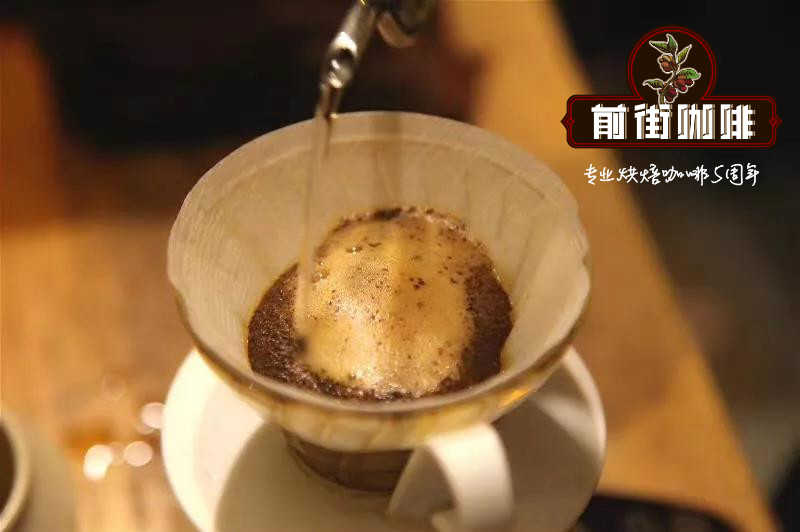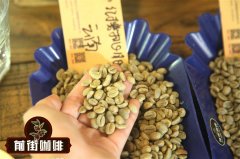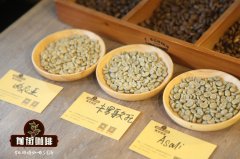Yunnan Coffee Fine Bean Pu'er Coffee Flavor introduction what are the fine beans of Yunnan coffee

Professional coffee knowledge exchange More coffee bean information Please pay attention to coffee workshop (Weixin Official Accounts cafe_style)
Yunnan coffee is the main and largest coffee producing area in China. At present, Yunnan coffee producing areas are mainly distributed in Simao, Banna, Wenshan, Baoshan and Dehong in the south and southwest of Yunnan Province.
Yunnan coffee imported by coffee companies is mainly produced in Pu 'er, a small town located in Simao area and also the hometown of Pu' er tea. It is surrounded by lush mountains and white clouds. Because Pu 'er tea is famous, coffee beans are also planted and produced in this tea town, which is somewhat surprising. The coffee farms operated in this area are mostly small farms of 300-700 mu, mainly producing Arabica coffee beans. The Tropic of Cancer just crosses Simao territory. It conforms to the basic conditions for coffee planting. The climate here is pleasant and belongs to the subtropical monsoon climate zone of low latitude plateau. It has the characteristics of low latitude, high temperature, rainy and calm wind. There is no cold in winter, no scorching heat in summer, and the average temperature is 19℃ in all seasons. The planting altitude is between 900 and 1300 meters. The annual average rainfall is 1500 mm. It is inherently suitable for producing high-quality coffee beans.
Before large-scale planting, it was not easy for Yunnan folk to drink a cup of coffee. To fry coffee, it was necessary to manually crush the parchment layer with a stone pestle, then stir the coffee beans manually with an iron pan, and then grind them into powder. It is very troublesome to drink a cup of coffee. This mode is also difficult to grasp the taste of coffee. Therefore, local people do not have the habit of drinking coffee. So far, it is quite easy to drink a cup of Pu 'er tea in Pu' er City. You can get it anywhere, but it is very difficult to find a place to drink a cup of coffee. You can't find a coffee shop in Pu 'er Street. Even coffee roasting factories can only be found in Simao City or Kunming.
I have visited several local coffee farms in Yunnan to observe their mode of cultivation and processing of coffee beans. Their main cultivation and processing techniques and experience come from international coffee companies. These international coffee companies purchase large quantities of green coffee beans from Yunnan producing areas and set up coffee agricultural experimental farms to teach local farmers how to cultivate and process coffee beans. They mainly introduce Colombia processing methods, which are similar to the Colombia model from washing beans to fermentation and drying beans. These international coffee companies, mostly large companies that mainly produce coffee powder and instant coffee in the world, have reasonable requirements for the quality of coffee beans, mainly the demand for quantity; therefore, the requirements for bean shape and defects in coffee quality are not strict, so local coffee farmers grow and produce processed coffee in this direction. Problems often arise in terms of cultivation and treatment patterns.
We tried to find some farms in Yunnan producing areas that can produce high-quality coffee, and communicated with some coffee farm owners technically. In some farms, we selected one that could cooperate with our processing technology and made some discussions and requirements to improve the quality of coffee beans. We also thanked the farmers for their cooperation in this process. At the same time, they also improved the quality. We worked hard to get good results and got the quality of Yunnan fine coffee beans.
Yunnan coffee is generally treated by washing mode. In the early stage, some large factories introduced Colombia treatment mode. Washing beans and drying beans are all adopted Colombia mode. Coffee fruits are separated from skin meat mechanically, fermented in fermentation tank for 24 hours, and then washed with water to remove viscous slurry. At the same time of washing, bad beans are separated by buoyancy of water. Up to now, the treated coffee is close to the level of foreign coffee countries.
However, in the latter stage of processing, local farmers use some rice processors to improve coffee bean processing, because rice and coffee beans have great differences, which often causes some coffee beans to be processed, resulting in a high rate of destruction. When we entered the production area, we had some discussions with the local coffee farmers. However, since most of the farms were small-scale operations and the funds were relatively insufficient, we found a more economical and effective model to match them. However, in order to meet the quality requirements, a lot of manual treatment was adopted to achieve the goal.
The Yunnan coffee beans imported by the company this time, under the close supervision of the whole process, although they still do not meet the most satisfactory requirements of our company, but for the local farms, they have not obtained the quality that they rarely have. This result, even the farms themselves are very satisfied, this is a very good experience. If they can upgrade and replace the processing equipment they use, they will certainly be able to achieve better and more stable quality. They do not have to spend a lot of manpower and procedures to achieve such a standard because of the quality required by us this time.
Yunnan coffee is located in the famous Pu 'er tea area of China because of its geographical environment. The coffee garden is not far away from the tea garden. The coffee has a little tea flavor, but it still retains the characteristics of Asian beans. The chocolate flavor is obvious, the taste is rich and full, smooth, the acidity is quite soft and moderate, and the sweetness is high. Although washed beans have some of the natural wildness of unwashed beans, overall, a satisfying, pleasant coffee bean.
Related recommendations: Yunnan small coffee beans how to brew Yunnan small coffee brand recommendations
Important Notice :
前街咖啡 FrontStreet Coffee has moved to new addredd:
FrontStreet Coffee Address: 315,Donghua East Road,GuangZhou
Tel:020 38364473
- Prev

Why is Jamaican coffee so expensive? why is Jamaican coffee so special?
Professional coffee knowledge exchange more coffee bean information please follow the coffee workshop (Wechat official account cafe_style) Jamaica-hearing this name, I think of the Blue Mountain Coffee in Jamaica. It feels kind of mysterious. In fact, Jamaica means the island of springs or the land of forests in Indian Arawak (Jamaica fell in 1509)
- Next

Katim Flavor Evaluation and hand-making skills of Yunnan Coffee how to make Yunnan Coffee
Professional coffee knowledge exchange more coffee bean information Please follow the coffee workshop (Wechat official account cafe_style) A few days ago, I tried several beans, Yunnan water washing, sun and honey treatment. These are all Katim Catimor from Yunnan, but they are handled in different ways. Since I used to be an amateur, I always heard that there was only pure arabica coffee.
Related
- Detailed explanation of Jadeite planting Land in Panamanian Jadeite Manor introduction to the grading system of Jadeite competitive bidding, Red bid, Green bid and Rose Summer
- Story of Coffee planting in Brenka region of Costa Rica Stonehenge Manor anaerobic heavy honey treatment of flavor mouth
- What's on the barrel of Blue Mountain Coffee beans?
- Can American coffee also pull flowers? How to use hot American style to pull out a good-looking pattern?
- Can you make a cold extract with coffee beans? What is the right proportion for cold-extracted coffee formula?
- Indonesian PWN Gold Mandrine Coffee Origin Features Flavor How to Chong? Mandolin coffee is American.
- A brief introduction to the flavor characteristics of Brazilian yellow bourbon coffee beans
- What is the effect of different water quality on the flavor of cold-extracted coffee? What kind of water is best for brewing coffee?
- Why do you think of Rose Summer whenever you mention Panamanian coffee?
- Introduction to the characteristics of authentic blue mountain coffee bean producing areas? What is the CIB Coffee Authority in Jamaica?

